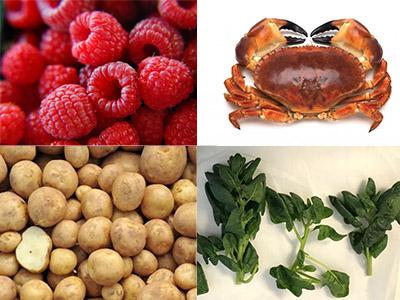Introduction
Scotland produces an extensive larder of nutritionally valuable animal and plant-derived products that can be grown, harvested, produced and processed to provide a healthy and sustainable diet. Evidence has accumulated suggesting that specific dietary constituents from plants and animals can prevent the onset and progression of socially and economically important chronic diseases (e.g. cardiovascular disease, type 2 diabetes and obesity). However innovative routes to increasing the intake of beneficial dietary components are required, especially in ‘at risk’ groups. Driven by Scottish Food and Drink Policies [A Recipe for Success (2009) and Becoming a Good Food Nation (2014)] which aim to increase access to good quality food to improve Scotland’s diet and food culture, this work focuses on providing scientific evidence to deliver plant- and animal-based foods with superior nutritional qualities, within a framework of reducing resource use, as well as examining barriers and opportunities for the farming and food and drink industries to enhance consumer uptake of such foods.

Aim of Research
The quality of Scottish primary produce is a critical attribute for Scottish producers as it differentiates their products in crowded markets and attracts premium prices. The diversity of these food products (from crops to shellfish) can be crucial for the sustainability of rural communities. They also contribute health benefits within the diet of Scottish consumers and are of key importance to the health, and wealth, of the nation.
Major advances in technology have provided opportunities to further our understanding of the accumulation of known health beneficial components (HBCs) in a range of Scottish food produce e.g. β-glucans in barley, polyphenols in berries, micronutrients in shellfish, and vitamin C in potatoes. Understanding the effects of environment, geographical location and more sustainable agronomic practices on HBC levels is important for consistent delivery of benefits. Similarly, understanding the barriers to the uptake of produce with healthier and more sustainable characteristics in supply chains, and consumers’ demand for such healthier and sustainable products is crucial so that improved Scottish primary products can deliver these health benefits.
This RD aims to identify novel or improved primary products with proven health benefits, grown under sustainable production systems, which have realistic potential for beneficial inclusion in the food chain.
The work will:
- Exploit genetic variability and breeding strategies for potatoes, barley and soft fruit
- Evaluate the potential of under-exploited species/varieties of barley, leafy green vegetables and root vegetables
- Improve the product quality of barley and soft fruit for health benefits
- Assess the impact of more sustainable farming on health promoting attributes of potatoes, grain, oilseed and beans
- Characterise the health-promoting properties of Scottish produce (soft fruit, shellfish)
- Assess the likely uptake of healthier sustainable produce by consumers and the supply chain
Progress
2021 / 2022
Improved food and drink production is at the heart of this work, and we have sought to provide solutions to improve primary produce via exploiting crop genetics, understanding production systems and the adoption of novel food sources. We have also examined constraint and opportunities for consumer uptake of new, healthier Scottish produce.
Covid delayed work completed this year contributed to these aims. Genetic markers were validated for the future selection of barley varieties enriched in HBCs such as phytochemicals, minerals and dietary fibres. In addition, transgenic potato lines with elevated levels of vitamin C maintained these high levels and showed no detriment in yield, or resistance to disease, heat, and drought stress, indicating their stability and agronomic practicality.
Studies on the mechanisms underlying the significant anti-obesogenic effect of blueberry supplementation in animal models discovered that crucial changes in bile acid metabolism were the result of alteration of microbiota composition by the berry components. This directly beneficial prebiotic effect further enhances the reputation of blueberries as a superfood. A human intervention study completed in 2021-22 also gave further evidence that berry polyphenols positively influence blood glucose levels and could provide a future breeding target for new health-plus berry varieties.
Novel food sources such as marine micro- and macroalgae (seaweed) provided extracts which were shown to have protective effects on human cell models and to induce anti-inflammatory effects.
Manipulation of light regimes within vertical farming (VF) systems had significant effects on HBC accumulation without compromising consumer acceptance with respect to taste, flavour, or appearance. This illustrates that the total environmental control available in VF systems may enhance nutritional value and health benefits of produce.
Examination of new products launched during the covid pandemic showed that the most popular categories were for healthier or nutritionally improved products over other ethical claims (e.g., sustainability). Studies on consumers preferences and willingness to pay for oat products showed a gradation across labels such as Scottish, low in sugar, and instant over protein-rich but specific combinations of labels could add significant further value.
Highlights
Raspberry polyphenols provide beneficial colonic metabolites that protect in colon cancer models, and thus can be related to the decreased incidence of colorectal cancer associated with the intake of polyphenol-rich fruit and vegetables. Invasive plants, including several common Scottish plants such as gorse, bracken and broom, were identified and examined as a valuable alternative source of protein (and other bioactive components) and the ability to contribute to meeting climate change targets. Aligned with this, funding (£97k) was awarded by the Newton Fund to explore exploitation of the Mezquite tree as a sustainable food source in Mexico, and work was initiated on the “'Effective Use of Scotland’s Natural Flora from Marginal Lands for Societal or Economic benefit” from the SEFARI SPARK fund
SEFARI scientists contributed to high profile events related to climate change and major food issues at and around COP26 in Glasgow. Presentations accompanying the 43rd TB Macaulay Lecture on 2nd November, where the guest speakers were Christiana Figueres and Scotland’s First Minister, Nicola Sturgeon, featured SEFARI research on sustainable diets, food security and crop diversification and tools to support better diet choices. COP events hosted by RBGE (6 November), Scotland Food & Drink (9 November), and Food Standards Scotland (10 November) featured SEFARI scientists discussing hemp as a nutritious and environmentally sustainable food, food and drink innovation and alternative proteins, and sustainable diets, respectively. Hemp as a new sustainable crop (Hemp Futures) also featured at the ‘Sustainability in the Creative and Cultural Industries Symposium’ (4-8th Oct) held as a run-up discussion forum for COP26.
The topics of sustainable diets and understanding factors related to nutrition and international impacts of our current food system were also represented at the Festival of the Future (Dundee, October 2021), in the lead up to COP26. Within the UK Research and Innovation presentation, work on the food security of Scotland and development of novel production systems was highlighted, including the science behind controlled environment agriculture, and the way forward for the production of sustainable food, pharma and chemicals. Aligned with this, substantial funding was obtained to examine the potential of novel VF systems to influence food quality and security (i.e. £ 0.5 M from Innovate UK and £ 421 K from Innovate-EUREKA
2020 / 2021
Substantial progress has been made in our understanding of the role of genetics, wild versus domesticated varieties, agronomy, and location/ environment on health beneficial component (HBCs) levels in crops relevant to the Scottish Farming community and crucial to the Scottish economy. Our studies in barley, potato and soft fruits have shown that genetic markers, such as QTLs, are available, and candidate genes involved in HBC accumulation have been identified and are being tested in model systems. These genetic markers for improved HBCs may be transferred into tools that can accelerate breeding of new varieties with modified HBC levels to improve Scottish health. Human studies on the effects of berry intake on health have identified components which influence type 2 diabetes and delineated mechanisms by which specific blueberry HBCs may influence their effects on weight management and metabolic health. These HBCs could be a target for selective breeding of healthier blueberry varieties. We have also begun to unpick the potential of novel controlled environment agriculture techniques, such as vertical farming, to extend the potential of crops to modulate HBC composition and overall sensory quality to provide healthier and tastier produce. Socio-economic studies have improved our understanding of the demand, competition, supply, and consumer purchasing preferences for Scottish produce (e.g. lamb and sheep meat).
Highlights
Health beneficial components: Researchers identified (i) how specific polyphenolic components of soft fruit inhibit an enzyme which regulates insulin signalling, identifying potential for soft fruit extracts in the management of type 2 diabetes, and (ii) Components from raspberries were identified in an in vivo study to exhibit genoprotective effects in the digestive tract possibly leading to a reduced risk of colonic cancer. (iii) Furthermore, a model study identified positive impacts of raspberry compounds and metabolites on neuroprotection through manipulation of neuroinflammatory pathways. (iv) SRP researchers described how the accumulation of health beneficial b-glucan accumulation in barley is influenced by specific individual genes (https://onlinelibrary.wiley.com/doi/abs/10.1111/tpj.14977).
2019 / 2020
In a year that brought geopolitical upheaval (e.g. Brexit), food attitude changes (the evolution of the plant based diet and the proliferation of plant-based foods) and significant societal disruption due to the Covid-19 pandemic, substantial progress has been made in improving our understanding of improving Scottish food quality for human health. An important thread is improving and exploiting our understanding of the role of genetics, wild vs domesticated varieties, sustainable agronomic practices, and location/ environment on health beneficial component (HBC) levels in crops relevant to Scottish Agriculture and crucial to the Scottish economy. Many studies aim to elucidate genetic markers that will accelerate the breeding of varieties of higher quality, nutritionally enhanced crops. There has been considerable success for targets such as dietary fibres and minerals in barley, vitamin C levels in potatoes and HBCs in soft fruits. The RD has also examined the potential of underutilised, wild varieties as sources of increased HBC levels. We have continued to explore the impact of production systems and have confirmed that integrated, rotation-based, lower input agronomic practices (also see https://sefari.scot/research/objectives/integrated-management-systems) had little detrimental effect on quality and nutritive values of crops economically important to the Scottish farming community. As part of the evolution of food production and the need to develop systems for nutritious food provision, we are working with SMEs to examine the impacts that new controlled environment agriculture production methods such as vertical farming have on modulating nutritional profiles as well as sensory criteria.
Allied with the food nutritional enhancement studies we have also targeted their health benefits and, with a focus on Scottish soft fruits, we are identifying components which influence type 2 diabetes, cardiovascular disease, and are elucidating the underlying mechanisms which may aid the control of weight management. Ultimately the identification key HBCs will feed back into the associated breeding programmes for enhancement and/or new product development. In addition, food system analyses continue to improve our understanding of the uptake of healthier produce (i.e. oats and potatoes) by retailers and consumers and the influence of targeted labelling (variety, health benefits and provenance) in this process.
Highlights:
- Scotland’s Dinner plate 2050: This Gateway sponsored event attracted 80 delegates from across the agri-food chain and highlighted the issues around Scotland’s possible future food choices with respect to climate change challenges on food security and environmental and economic sustainability. Highlighting WP3.1 research, it also included speakers from NFUS, QMS, Scotland Food and Drink, New Nutrition and food innovation SMEs - https://sefari.scot/research/scotland%E2%80%99s-dinner-plate-2050. This topic was echoed in an exhibit for school children at the Royal Highland Show (Jun-19), which was visited by the First Minster.
- Food Production in a Changing Climate: An STV documentary, ‘Climate of Change’ , highlighted research to increase plant resilience to climate change and reduce GHG emissions. Future solutions for sustainable, high quality food included areas from this RD such as vertical farming, molecular breeding and plant-derived protein. Researchers engaged in the ‘climate conversation’ as part of the Scottish Government (SG)/Sustainable Scotland Network initiative - Climate Week. Pledges collected will form part of a public display highlighting how food-focussed research will contribute towards the SG’s target of achieving 0% net emissions by 2045.
Policy and Public Engagement: RD research was showcased in an invited talk by the DEC Advisor to the Scottish Parliament Cross Party Food Group (Jan-20) entitled ‘Connecting Climate Change, Natural Capital and Health - https://www.parliament.scot/CrossPartyGroups/Session5CrossPartyGroup/Agendas/Food_20200128.pdf
- Stakeholder Engagement and Presentations: Researchers presented on the potential of Vertical Farming at the BBSRC/EPSRC Advanced Horticulture Workshop (held - 25/02/2020). This meeting involved representatives from diverse backgrounds (engineering to bioscience related disciplines) and explored how we can stimulate sustainable, efficient and profitable production systems for the horticulture sector.
A RD researcher chaired a discussion panel at the Royal Society’s Future Food-Health and Sustainability Meeting on the UK’s role in improving novel food production - https://royalsociety.org/topics-policy/publications/2020/conference-report-future-food/
- Publications: New findings include a raspberry component, salidroside, with potential beneficial effects in models of Huntington’s Disease, effects of blackcurrant juice on attention, mood and brain activity, and a potential role of berry polyphenols in neuroprotection. Follow-up studies are looking at traits which could be used to breed high-salidroside varieties. Work that outlined potential genetic markers that influence the levels of such health beneficial polyphenol components in blackcurrants was published https://pubmed.ncbi.nlm.nih.gov/32030531/
- Funding leverage success – Researchers secured funding to improve nutritional quality in cereals, including barley, by exploiting the genetic diversity of grain anatomy - https://gtr.ukri.org/projects?ref=BB%2FT002786%2F1#/tabOverview. RD-related work has also been successful in leveraging GCRF funding to exploit the wide diversity of mineral-rich (zinc and iron) beans and support their uptake by rural populations in Africa - https://gtr.ukri.org/projects?ref=BB%2FT008865%2F1. RD-based expertise in understanding the effects of new production systems was crucial in the funding of research to develop aeroponic systems for seed potato production in Kenya - https://gtr.ukri.org/projects?ref=105657.
2018 / 2019
Progressing the understanding of the effects of genotype, wild/domesticated varieties, sustainable agronomy, and location/environment on health beneficial component (HBC) levels in crops continues. Studies into genetic control of HBC accumulation in barley, potato and soft fruits indicate that genetic markers for selection of varieties with improved HBCs are feasible. Integrated, lower input agronomic practices have no detrimental effect on HBC levels in major Scottish crops. Human studies continue to assess the effects of berry intake on health by identifying the components which influence type 2 diabetes and elucidating the underlying mechanisms which may aid weight management. In addition a new study is investigating effects on cardiovascular health. Our understanding of uptake of healthier produce by retailers and consumers and the interactions of price, income and demand also continues to improve.
Highlights:
- Soft fruit health benefits: Based on sustained SRP, Underpinning Capacity and external leveraged research funding, SEFARI researchers were invited to publish a review on ‘Evidence for Health Benefits of Berries’ in the high impact journal Annual Plant Reviews highlighting the effects of consuming berries or their phytochemical components on neurodegenerative and non‐communicable diseases and the underlying mechanisms involved.
- Presentations to the International Association of Agricultural Economists: SEFARI scientists presented two papers at the meeting (August 2018), (i) “Exploring the effects of increasing underutilized crops on consumers’ diets: the case of millet in Uganda”, output from a BBSRC GCRF project, but applying methodology used in the SRP to simulate the impact of increasing the amount of fruit and vegetables in the diet, and (ii) “Rate of success of new dairy products in the UK: how important are health and sustainability claims?”
- Raspberry research: Research on raspberry bioactive compounds and health won a prize for the best poster on novel bioactives at the 2nd International Conference on Food Bioactives and Health (http://www.itqb.unl.pt/fbhc2018). A published book chapter identifies both direct health benefits of consumption and opportunities for use of bioactives from soft fruits.
- Microbiological environment in vertical farming: Theme scientists have secured Innovate-UK KTP funding with Intelligent Growth Solutions Ltd seeking to control the microbiome within the growing environment in vertical farming systems and reduce the need for crop sanitisation.
- ‘Scotland 2030: Our Food Future’: Theme research including the protein content and nutritional aspects of wild vs cultivated vegetable species, and related food waste streams, as potential dietary sources was presented at a Scotland’s Futures Forum entitled “Scotland 2030: Our Food Future” co-hosted by Nourish (Sep 18; see video highlights here). Chaired by Claudia Beamish MSP, and well attended by policy and wider stakeholders, this seminar used Nourish Scotland’s vision of a sustainable food system to kick-start a discussion on food in Scotland. The work was also highlighted at the ‘Nutritionists in Industry’ meeting (Sept-18) to over 100 nutritionists working across the private sector, at the European Microbiome Congress (Nov-18), and in a keynote address to a new European network on plant-based diets (Jan-18).
- Presentation to the Association of Scottish Shellfish Growers conference: A SEFARI scientist was an invited speaker at the meeting (October 2018), and presented “Shellfish and the Health of the Nation’ outlining the health benefits of consuming Scottish shellfish based on work within the deliverable.
2017 / 2018
This research programme continues to provide evidence for potential enhancement of natural health beneficial components (HBCs) in Scottish primary produce. The genetic basis for improved HBC content is being defined, opening up potential selection of new improved crop varieties for Scottish agriculture. The effects of seasonality, environment and location on crop and seafood quality have also been examined. Evidence for health benefits of soft fruit continue to accrue with positive effects on glycaemic control and weight management coming to the fore. Research has also studied some of the barriers to uptake of healthy produce by both retailers and consumers. Interwoven into the research, a detailed and bespoke set of stakeholder engagement events have been organised to disseminate these good news stories to key industrial, non-governmental organisation, policy, consumer and academic audiences.
Highlights:
- Novel work has been published on the potential benefits of fruit polyphenols crossing the blood-brain barrier and potentially aiding neuroprotection in age-related diseases such as Alzheimer’s and Parkinson’s disease.
- In addition, the first paper was published from the Centre for Sustainable Cropping on the impact of conventional and integrated management systems on the water-soluble vitamin content of (Scottish) potatoes, field beans and cereals.
- Initial Quantitative Trait Loci (QTLs) have been identified for vitamin C content in potatoes. Linkage groups relevant to this trait have been identified on chromosomes 3 and 4, and candidate genes are being investigated which could lead to breeding of vitamin C enhanced potato varieties.
- Prof Wendy Russell, whose work was selected and submitted by SEFARI Gateway, was recognised by the Food and Drink Federation for work with the industry creating new opportunities for producing healthier options for food.
- Significant funding applications were awarded, which add value to the programme. ‘Maringa: delivering nutrition and economic value to the people of Malawi’ (£480,401), and ‘Formulating value chains for orphan crops in Africa’ (£470,460) are BBSRC Global Challenges Research Fund projects. ‘Transition paths to sustainable legume-based systems in Europe’ (€5M; MRP, €840k) is an EU H2020-funded project. Also, RD3.1.1 scientists were part of a consortium of 14 partners from the UK, France (INRA), the Consultative Group for International Agricultural Research Institutes and a range of African national agricultural institutes that secured Gates Foundation funding (project total - $13.7M) for ‘Breeding Root Tubers and Banana Products for End User Preferences.
2016 / 2017
Scotland has a reputation as a land of high quality and healthy food produce and the work delivered in this programme has identified some of the sources of the natural components underpinning these attributes. The significant enhancement of Vitamin C in potatoes, the world's third most important food crop, through selective breeding looks viable. Similarly, the development of barley as a raw material for human food shows great potential. Scottish fruit continues to add to an accruing portfolio of health benefits with research strongly suggesting positive effects on glycaemic control relevant to type 2 diabetes. Integrated with the research, there has been a full programme of stakeholder engagement spanning academic, industrial, non-governmental organisations, policy and consumer audiences, undertaken to elaborate and inform the relevance of this research to each audience and their priorities.
Highlights:
• Several PhD studentships were appointed to develop aspects of RD3.1.1 research, specifically on the health benefits of seafood and soft fruit derived components.
• Two papers have focused on the potential health benefits of newly identified triterpenoid compounds, with putative anticancer effects, which could be included as targets in the Scottish Raspberry Breeding Consortium programme
• Work published in Public Health Nutrition highlighted that the nutritional composition of farmed fish varies over time and so dietary advice may need to be re-considered [de Roos et al. 2017]. The work had wide public dissemination, as the authors used social media to blog about the paper, as well as promoting it through the journal homepage.
• An external funding application was awarded, complementing the work on shellfish in this deliverable: ‘Crabmeat consumption and health: do crabmeat consumers have a greater cadmium burden compared to non-crabmeat consumers?’ (£96,634).
Future Activities
The outcomes of the 2016-22 SRP have informed the 2022-27 programme in many ways and work continues in certain key areas. These include studies on primary production targeting the sustainability of the processes identified and developed in SRP 2016-22 such as vertical farming, barley processing and livestock production (Theme B1 and B5). Similarly, the identification of the basis of nutrition/health benefits in crops has led to work on novel crops and cropping systems (Theme B1), Food Supply and Security (B4), Food and Drink Improvements (B5), Diet and Food Safety (B6) and Human Nutrition (B7).
Selected Outputs
2016/17
Novel colon-available triterpenoids identified in raspberry fruits exhibit antigenotoxic activities in vitro. (2016) – paper published in Molecular Nutrition & Food Research by McDougall et al
2017/18
Polyphenols journey through blood-brain barrier towards neuronal protection. (2017) – paper published in Scientific Reports by Figueira et al
Impact of conventional and integrated management systems on the water-soluble vitamin content in potatoes, field beans, and cereals. (2018) – paper published in the Journal of Agricultural and Food Chemistry by Freitag et al.
The composition of potentially bioactive triterpenoid glycosides in red raspberry is influenced by tissue, extraction procedure and genotype. (2017) – paper published in the journal Food & Function by McDougall et al
The impact of blackcurrant juice on attention, mood and brain wave spectral activity in young healthy volunteers (2018) – paper published in Nutritional Neuroscience by Watson et al.
2018/19
Regular crabmeat consumers do not show increased urinary cadmium or beta-2-microglobulin levels compared to non-crabmeat consumers. (2019) – paper published in the Journal of Trace Elements in Medicine and Biology by Sneddon et al
Evidence for Health Benefits of Berries. (2018) – a review published in Annual Plant Reviews by Foito et al
Raspberry Fruit Chemistry in Relation to Fruit Quality and Human Nutrition in Raspberry Breeding, (2018) – a chapter in Raspberry (Springer) by Hancock et al
Identification and microbial production of the raspberry phenol salidroside that is active against Huntington’s disease (2019) – paper published in Plant Physiology by Kallscheuer et al
Blood-brain Barrier Transport and Neuroprotective Potential of Blackberry-Digested Polyphenols: An in Vitro Study – (2019) – paper published in the European Journal of Nutrition by Figueira et al.
Television
2019/20
Identification and microbial production of the raspberry phenol salidroside that is active against Huntington’s disease (2019) – paper published in Plant Physiology by Kallscheuer et al
Quantitative Trait Loci Mapping of Polyphenol Metabolites in Blackcurrant (Ribes nigrum L.) (2020) – paper published in Metabolomics by Abreu et al.
Importance of Health Claims in the Adoption of New Breakfast Cereal Products in the UK (2019) – paper published in Nutrients by Costa-Font & Revoredo-Giha
Anthocyanin-enriched bilberry extract attenuates glycaemic response in overweight volunteers without changes in insulin (2020) – paper published in Journal of Functional Foods by Alnajjar, Mahasin et al
2020/21
Analysis of polyphenolic metabolites from in vitro gastrointestinal digested soft fruit extracts identify malvidin-3-glucoside as an inhibitor of PTP1B. (2020) - paper published in Biochemical Pharmacology by Nigel Hoggard et al
Bioaccessible raspberry extracts enriched in ellagitannins and ellagic acid derivatives have anti-neuroinflammatory properties. (2020) – paper published in Antioxidants by Gordon McDougall et al
Fruit-based beverages contain a wide range of phytochemicals and intervention targets should account for the individual compounds present and their availability. (2020) – paper published in Foods by Wendy Russell et al.
Targeted mutation of barley (1,3;1,4)-β-glucan synthases reveals complex relationships between the storage and cell wall polysaccharide content. (2020) – paper published in the Plant Journal by Kelly Houston et al.
Articles in popular press
Taking an alternative approach to crops, An article published in The Scottish Farmer in 2020.
2021/22
Ex vivo fecal fermentation of human ileal fluid collected after raspberry consumption modifies (poly)phenolics and modulates genoprotective effects in colonic epithelial cells – paper published in Redox Biology by Dobani et al
Invasive plants are a valuable alternate protein source and can contribute to meeting Climate Change targets – paper published in Frontiers in Sustainable Food Systems by Iyer et al
High throughput method development and optimised production of leaf protein concentrates with potential to support the agri-industry – paper published in Journal of Food Measurement and Characterization by Ayer et al
Reports
A comparison of impacts: lettuce production - the environmental footprint of production. A report for the Scottish Government, 2021





